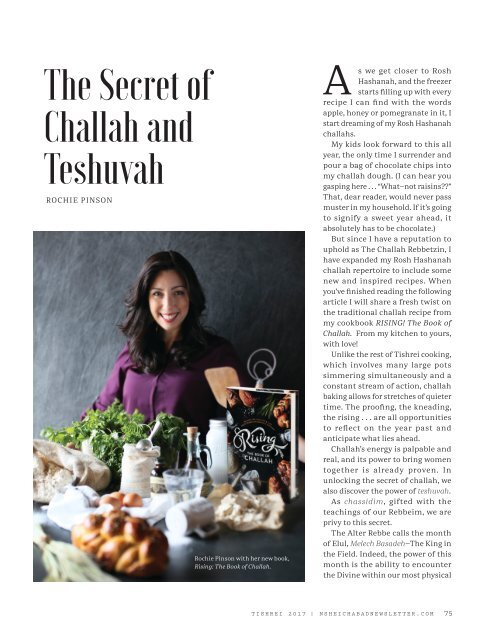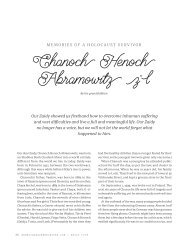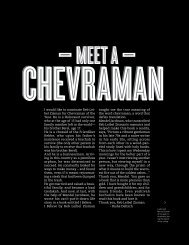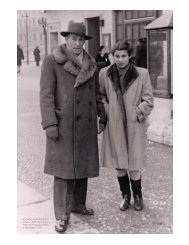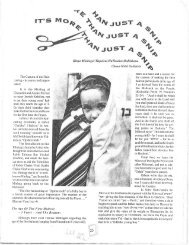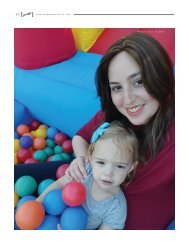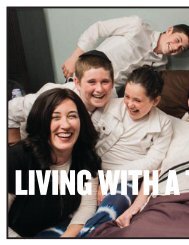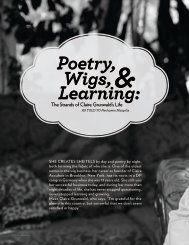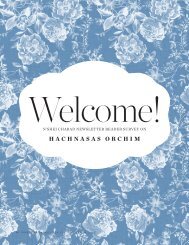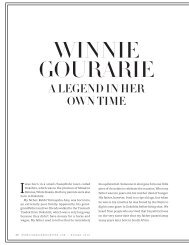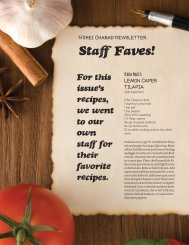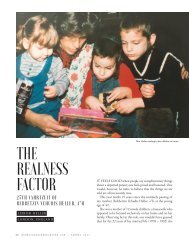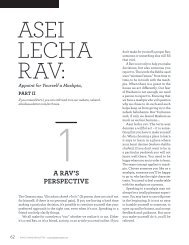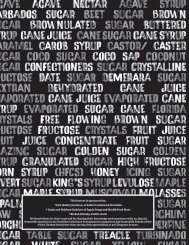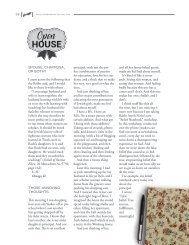Create successful ePaper yourself
Turn your PDF publications into a flip-book with our unique Google optimized e-Paper software.
The Secret of<br />
Challah and<br />
Teshuvah<br />
ROCHIE PINSON<br />
Rochie <strong>Pinson</strong> with her new book,<br />
Rising: The Book of Challah.<br />
A<br />
s we get closer to Rosh<br />
Hashanah, and the freezer<br />
starts filling up with every<br />
recipe I can find with the words<br />
apple, honey or pomegranate in it, I<br />
start dreaming of my Rosh Hashanah<br />
challahs.<br />
My kids look forward to this all<br />
year, the only time I surrender and<br />
pour a bag of chocolate chips into<br />
my challah dough. (I can hear you<br />
gasping here . . . “What—not raisins??”<br />
That, dear reader, would never pass<br />
muster in my household. If it’s going<br />
to signify a sweet year ahead, it<br />
absolutely has to be chocolate.)<br />
But since I have a reputation to<br />
uphold as The Challah Rebbetzin, I<br />
have expanded my Rosh Hashanah<br />
challah repertoire to include some<br />
new and inspired recipes. When<br />
you’ve finished reading the following<br />
article I will share a fresh twist on<br />
the traditional challah recipe from<br />
my cookbook RISING! The Book of<br />
Challah. From my kitchen to yours,<br />
with love!<br />
Unlike the rest of Tishrei cooking,<br />
which involves many large pots<br />
simmering simultaneously and a<br />
constant stream of action, challah<br />
baking allows for stretches of quieter<br />
time. The proofing, the kneading,<br />
the rising . . . are all opportunities<br />
to reflect on the year past and<br />
anticipate what lies ahead.<br />
Challah’s energy is palpable and<br />
real, and its power to bring women<br />
together is already proven. In<br />
unlocking the secret of challah, we<br />
also discover the power of teshuvah.<br />
As chassidim, gifted with the<br />
teachings of our Rebbeim, we are<br />
privy to this secret.<br />
The Alter Rebbe calls the month<br />
of Elul, Melech Basadeh—The King in<br />
the Field. Indeed, the power of this<br />
month is the ability to encounter<br />
the Divine within our most physical<br />
TISHREI 2017 | NSHEICHABADNEWSLETTER.COM 75
spaces.<br />
The act of making challah is a<br />
very mundane and messy one. You<br />
can’t get much more physical than<br />
being elbow deep in a sticky dough.<br />
Yet it is precisely there, deep in our<br />
challah bowl, that we can encounter<br />
our truest self, experience connection<br />
to Elokus, and realize the very fact of<br />
dirah b’tachtonim.<br />
Our mother Sarah knew this. She<br />
understood that in her relationship<br />
with her husband, she could bring<br />
the Shechinah to rest over her tent.<br />
Through beautifying her home<br />
through the Shabbos candles, she<br />
could have the light burn timelessly,<br />
and through the nurturing of her<br />
family with challah, she could<br />
bring an everlasting freshness and<br />
goodness into her home.<br />
With her constant awareness of<br />
the connection between heaven and<br />
earth, melech and sadeh, Sarah was<br />
able to infuse all of her mundane,<br />
daily service with a pure awareness<br />
of G-dliness. As such, all she touched<br />
was connected with life and would<br />
stay alive, lit and fresh.<br />
In the month of Elul, we search<br />
for our lost connection. We yearn<br />
for teshuvah, to return to the hei of<br />
creation, that original breath of life<br />
that is our perfect neshamah.<br />
What better way to re-establish<br />
our attachment than through an<br />
act of life itself, baking challah to<br />
nourish our family, both physically<br />
and spiritually?<br />
The mitzvah of challah was given<br />
as we stood about to enter into our<br />
promised land, and in the beginning<br />
it applied only in the land of Israel.<br />
And yet, we are told that any wheat,<br />
even from chutz la’aretz, that would<br />
be brought into the Land of Israel<br />
would become sanctified by its very<br />
presence in Eretz Yisroel, and take on<br />
the laws of challah (Challah 2:1)<br />
This law of challah, the law of<br />
return, is the story of a baal teshuvah.<br />
One who returns to their place of<br />
origin, and whose entire being then<br />
becomes infused with the kedushah<br />
of their new spiritual reality.<br />
Unlike many of the other terumos,<br />
or gifts, the Torah clearly states that<br />
this particular terumah of challah is a<br />
gift for all future generations. Chazal<br />
told us that not only does the mitzvah<br />
of challah apply beyond the time of<br />
the Beis Hamikdash, but in every<br />
place we find ourselves as well.<br />
Challah, like teshuvah, transcends<br />
time and space. It is our way of<br />
reaching beyond, to a place of infinite<br />
possibility and formlessness, and<br />
recreating, renewing and rewriting<br />
our reality.<br />
By removing a piece of the dough,<br />
which is the sustenance meant to<br />
feed ourselves and our family, we<br />
are transcending our physical reality<br />
and reaching into a place of infinity.<br />
From this place of formless, infinite<br />
possibility, we are able to draw down<br />
all the blessings and create a shift in<br />
our physical reality.<br />
Teshuvah, likewise, gives us the<br />
ability to transcend the physical<br />
universe of cause and effect—where<br />
our actions create irreversible<br />
reactions—and reverse and even<br />
transform our past.<br />
Although the actual mitzvah<br />
of challah is the hafrashah, the<br />
removal of a piece of dough to<br />
be burnt, I always talk about the<br />
process of challah as being itself an<br />
opportunity for deep introspection<br />
and connection.<br />
As we make our challah for Rosh<br />
Hashanah, we have an amazing<br />
opportunity to use the process to<br />
tap into our capacity for real and<br />
transformational teshuvah.<br />
The Baal Shem Tov divided the<br />
process of teshuvah into three<br />
stages: Hachna’ah, Havdalah, and<br />
Hamtakah. Submission, separation,<br />
and sweetening. As we make our<br />
challah, we can live out these three<br />
stages through the process, and find<br />
our way back through the beautiful<br />
mitzvah of challah.<br />
1. HACHNA’AH / SUBMISSION:<br />
A time for the messiness, when we<br />
need to put our hands way into the<br />
guck of the still-loose and separated<br />
ingredients and just be present with<br />
the situation as it is, right now. It is<br />
the awareness that there is work to<br />
be done, and maybe I don’t want to<br />
struggle with it, but it’s there and<br />
it needs to be dealt with. So we roll<br />
up our sleeves and get right into the<br />
heart of the mess and we knead all<br />
the separate ingredients together.<br />
This is Elul, the first stage of<br />
teshuvah. It is an awareness of the<br />
disjointedness and a desire to unite<br />
all the disparate elements of our lives<br />
into a cohesive whole. In this place we<br />
submit to reality as it is, and feel the<br />
pain and isolation of being separated<br />
from the Eibershter, and from our<br />
own deepest self.<br />
2. HAVDALAH/SEPARATION:<br />
A time of detachment. We walk<br />
away from the dough and allow it to<br />
rise. We don’t touch it or deal with<br />
it right now. We know that we have<br />
done what we can and we step away<br />
from the situation.<br />
This is Rosh Hashanah. It is a<br />
time of letting go of our regrets, of<br />
our connection to our past mistakes,<br />
and living in the present as a perfect<br />
tzaddik. We wear Yom Tov clothes,<br />
feast, and throw our mistakes into<br />
the water at tashlich. We don’t talk<br />
about aveiros, and we understand<br />
deeply that we are not our mistakes.<br />
76 NSHEICHABADNEWSLETTER.COM | TISHREI 2017
At our very essence, we are pure and<br />
holy.<br />
3. HAMTAKTAH /SWEETENING:<br />
We take off a piece of challah,<br />
acknowledging that in the separation<br />
is where we find the wholeness. The<br />
challah dough looks perfect and<br />
whole, but until we remove that piece,<br />
it is incomplete. The brokenness<br />
brings us to the wholeness. We<br />
acknowledge that all of what we<br />
receive is from Above. All the pain<br />
and the “mistakes” were part of a<br />
larger plan that brought us to this<br />
very moment of higher awareness.<br />
We bake the dough in a biyur of<br />
eish, fire, which by its very heat and<br />
intensity brings the dough into its<br />
fullness, so that we can absorb it and<br />
finally taste its sweetness.<br />
This is the time of Yom Kippur<br />
through Sukkos. We do say viduy<br />
and al chet, but it is from a place<br />
of understanding that we are<br />
bigger than our mistakes, and we<br />
acknowledge that all of the things<br />
we have done and experienced have<br />
allowed us to come to this place<br />
of teshuvah and deeper, higher<br />
connection. With this awareness<br />
we enter into the joy of Sukkos,<br />
when we can just be at one with<br />
Hashem, embraced in the Divine<br />
hug of the sukkah, and finally when<br />
we can experience the joy of simchas<br />
beis hasho’evah—the joy of bringing<br />
the water back into the Mikdash.<br />
This represents the re-integration<br />
of all we threw away, bringing it<br />
back into our lives, and seeing the<br />
interconnectedness of all things in<br />
our life: how each moment—both the<br />
positive and the difficult —brought us<br />
to this very place.<br />
So, dear reader, as you stir, season,<br />
and generally sweat it out in your<br />
kitchen this Elul, take the time to<br />
knead your challah dough with a<br />
little extra intention. Wait for a quiet<br />
moment to separate your challah<br />
with mindfulness, and remember<br />
when you say the brachah, and you<br />
ask G-d for His blessings, you are<br />
accessing the awesome power to<br />
renew, reveal and rewrite a story of a<br />
good, sweet and healthy year to come.<br />
And now for that challah recipe I<br />
promised you, so we can fulfill the<br />
mitzvah in actuality, and taste the<br />
sweetness of our efforts, please turn<br />
to the color section at the very end of<br />
this magazine.<br />
Rochie <strong>Pinson</strong> is a wife, mother,<br />
artist and shlucha in a<br />
large and growing community in<br />
Carroll Gardens, Brooklyn. Together<br />
with her husband, Rabbi<br />
Dovber <strong>Pinson</strong>, she founded and<br />
directs the IYYUN|Chabad Center<br />
for Jewish Spiritual Enrichment<br />
in Brooklyn, which reaches many<br />
thousands of people, both locally<br />
and globally, with classes,<br />
events, a popular website, and<br />
the publication of many books<br />
devoted to Judaism and spirituality.<br />
TISHREI 2017 | NSHEICHABADNEWSLETTER.COM 77


